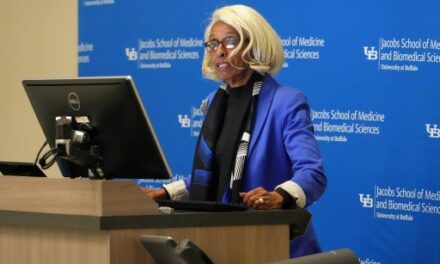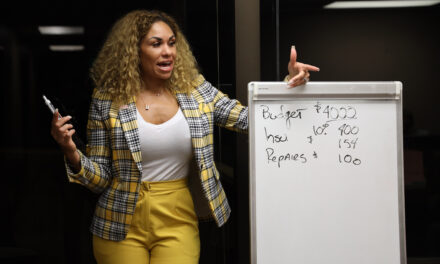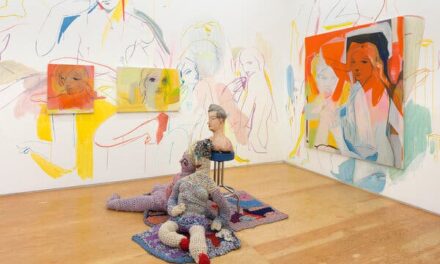Ridley Scott’s Alien holds a special place in the heart of Jewelle Gomez, but not simply because Sigourney Weaver’s Ellen Ripley was just her type. “If you were going to come out, that was the movie to come out to,” she says with a chuckle over video call from her home office in San Francisco. The year was 1979, Gomez was 31, and her mother, Dolores, and grandmother, Lydia, were in New York City for a visit when they went to see the sci-fi horror at a cinema near Times Square. “We were in the bathroom after and my mother started reading graffiti on the bathroom stall,” Gomez says. “My mother says: ‘Oh, here’s one. It says Dykes unite!’ And I was like, should I speak? Should I not speak? What do I say?” Her grandmother didn’t give her a chance to answer: “She says: ‘Oh, that’s nothing. Jewelle has an ink stamp on her desk at home and it says Lesbian money!’ All three of us cracked up and I breathed a sigh of relief. It was lovely.”
Forty-four years later, Gomez, feminist author, poet, playwright and activist, continues to claim space for queer storytellers in the realm of speculative fiction and beyond. In 2020, she was the recipient of the Bram Stoker award for Lifetime achievement, cementing her status as a literary trailblazer whose work has long championed those whose identity intersects across gender, queer and racial lines. Her most famous work, The Gilda Stories, is a groundbreaking work of Afrofuturism before the term was even coined. The 1991 book deconstructed and rebuilt the vampire myth in the shape of its Black lesbian protagonist – the first novel in the US to be published with such a lead.

A huge fan of Stephen King, Joanna Russ, Frank Herbert’s Dune, the Star Trek TV series, and, of course, Dracula films, Gomez saw speculative fiction as the ideal medium to present her values and principles. Not to mention to challenge the publishing norm that only white stories of this ilk would sell. “I was coming along at a time when publishers would say: ‘We’ve already got a Black female writer, we don’t need you,’” Gomez says. Turns out, the world did need her. The Gilda Stories recast Sheridan Le Fanu’s 19th-century vampire heroine Carmilla as a character who begins as an enslaved child taken in by a multi-ethnic vampire coven. Through each episodic chapter, she navigates power, desire, violence, oppression and family within the marginalised communities in which she finds herself, from 1850s Louisiana through the feminist movements of the 70s and 80s, to the dystopian future of 2050.
Originally penned as a short story, the novel was inspired by an incident in New York in which the author was verbally abused by two men while she was using a phone booth. They shouted lewd remarks; Gomez responded with fiery outrage, and the impulse for this sweeping narrative was born. “It started out as a revenge story,” she says, but as she considered the power over life and death these vampire immortals have, it became a meditation on loss. “I wanted to write more about someone who doesn’t have to lose people if she doesn’t want to.”

Her longtime friend Audre Lorde told her these stories were the makings of a novel, and after being rejected by several publishing houses for her “unsellable” lead, she found an editor in Nancy Bereano, the founder of the lesbian feminist press Firebrand Books. Bereano in turn challenged Gomez to push beyond the established canon. “I had been following the traditional mythology so closely so I had to think, what was her evolution? What is the philosophy behind her? Why is she different from other vampires?” says Gomez.
The Gilda Stories’ vampire mantra of “we take blood, not life, and leave something in exchange” defined a new generation of supernatural storytelling. It also exemplified the tenets of inter-community solidarity that Gomez had become accustomed to as an activist in the Black Power, feminist and LGBTQ movements of the 70s and 80s. “Writing speculative fiction has been a political act for me,” she says. Since The Gilda Stories’ release, Gomez’s character has popped up in various other short stories and on stage in her play Bones & Ash. She is set for a return in a “more interior” sequel Gomez is penning called Gilda: Blood Relations.
Gomez’s groundbreaking stories have meant much to Black feminist writers who have since pursued their own Afrofuturist discourse, but her influence can also be seen in such recent TV adaptations of Interview with the Vampire and Lovecraft Country. “There’s a sensibility that we can pass down in our cultures,” says Gomez. “That changes the way the culture works, even if it’s only in tiny ways.”
Gomez was born in 1948, to nursing aide Dolores LeClaire, a light-skinned woman of mixed African American and Native American heritage, and bartender John Gomez, a Black man whose family hailed from Cape Verde. Their relationship was short-lived, and Gomez was sent to live with her paternal grandmother. She died when Gomez was eight and her maternal great-grandmother, Grace, then took her in. “I got the best part of the bargain with my great-grandmother, and my grandmother, because they were both lively and interesting women,” she says fondly. “The other part of me was feeling like: what did I do wrong? Why doesn’t my mother want me? No matter how wonderful your life is, the kid feels it’s their fault. You did something. Why are they over there with their family and I’m not in it?”

Race was part of the reason for her rejection. Dolores had married a white cab driver, nicknamed Peachy, and given birth to a white-passing son (Gomez adored both), and could pass for white herself in the “dying mill town” in Rhode Island where she lived. Gomez would visit her mother only briefly during holidays and “it was pretty horrible”, she says. “People had no work and people of colour were looked down on in very open ways. I remember taking my little brother to a movie theatre and being told by the person who sold the tickets: ‘The entrance is around to the side.’”
Being othered by descendants of white colonisers was tough for someone who can trace their lineage all the way back to the 17th-century Wampanoag chief Massasoit Ousamequin. However, it was only when Gomez got older and spoke to her great-grandmother about their heritage that she felt comfortable claiming all parts of her ethnic background – that personal navigation features heavily in her most recent poetry collection, Still Water. “Growing up in the 60s, everything was about the African American identity, which I certainly embraced,” she says. “I feel fuller for knowing more about my mother’s side of the family but we in the US, certainly, have a tendency to want to put people in a singular box.”

Gomez knew she was lesbian at the age of 11 but it wasn’t until her sophomore year at her all-girls’ school that she experienced her first love affair with a classmate. “We saw each other and regularly stayed over at each other’s houses; I loved her,” she says. It was, of course, a secret relationship, yet the queer community was no secret to Gomez.
Through her dad she was introduced to the works of James Baldwin, which would later inspire her 2010 play Waiting for Giovanni. Aged 14, she found a copy of Baldwin’s landmark novel Another Country in her dad’s house. “I read it and I was so moved. I didn’t understand it but was very taken by his use of language, even at a young age. And later, I read Giovanni’s Room and was so hurt by the sadness of the story and the injustice that he was writing about.”
During her undergraduate studies at Northeastern University in Boston, where she had a full scholarship to major in sociology with a minor in theatre, not only did her father die but Martin Luther King was assassinated. “People went crazy in the streets,” she says. “I remember just sobbing and thinking, mistakenly: ‘Now people will see how bad racism really is. That somebody like this could be killed.’ It did change things to some extent, but not as dramatically as I thought.”
King’s death marked a turning point for Gomez, who soon began a work placement on Say Brother, a Black-focused programme for a Boston public TV station. “To work on an educational, cultural television show with a predominantly African American staff really did change my life socially,” she remarks. She was also developing her activist voice on campus as the editor of the Black student newspaper, and successfully campaigned for an African American student union building, but it wasn’t all work. “I lived a racy life while I was in college,” Gomez says. “I did a lot of drugs and went with a lot of guys who had bad reputations. I knew I just had to get myself in a situation where I could find other lesbians.”

In 1971, after graduating, she moved to New York to begin a new stage of her life in the multicultural city, but her expectations didn’t quite match reality. The roommate with whom she shared a Central Park West flat moved out two weeks after Gomez came out to her. She was also fired from her job at The Electric Company, the children’s sketch comedy show, “because it was high pressure, fast work and I just didn’t have the skills”. Her great-grandmother died the same year. Gomez was depressed, but, luckily, former colleagues rallied around to support her, including an Electric Company cast member, Morgan Freeman, who helped her move to a new place. “He and his wife knew I was having a hard time and I didn’t know much about moving,” Gomez says. “I put all my clothes in this refrigerator box I found and I’ll never forget Morgan came in and said: ‘You fucking crazy? How am I supposed to pick that up?’”
Gomez soon found her footing in New York. She got her master’s degree from Columbia’s school of journalism, and worked part-time as a stage manager, which helped her dating life. “My first two lovers in New York worked in theatre; one in casting, the other was a lighting designer, both African American women,” she says. “I understood that if I could do some of the things that I really was interested in doing, I would meet people, I would find a circle of female friends and my life would then start to feel like it was whole.”
Gomez found many new avenues to embrace her lesbian feminist identity. In 1985, she became the founding treasurer of the LGBTQ rights organisation Glaad, and helped combat the homophobic reporting around the Aids crisis. “The headlines were horrific,” she says. “We’re talking about human beings, but they acted as if they were talking about zombies.” She was also a member of Salsa Soul Sisters, a group of Black and Latina lesbians who did social events, political events and activism, and she began writing for the lesbian literary journal Conditions. “Those are the two places where I found my lesbian identity coalescing and understanding that it was all connected to being an activist, and that my activism was related to my life as a writer.”
In 2008, Gomez married longtime partner Diane Sabin on Halloween, at the main branch of the San Francisco public library. They were one of the first gay couples to be married in California, having served as litigants suing the state for the right to legally marry since 2004. They had met 20 years earlier, in 1984, when Sabin picked up Gomez and her then-partner at the airport for a series of poetry readings in San Francisco. It was love at first sight, she says, but they wouldn’t officially get together until 1992. In spite of the delay, Gomez knows that her timing has always been spot on: “I feel like on each increment of my politicisation – to understand the Black arts movement, the civil rights movement, the lesbian feminist movement, the gay movement, Aids activism – I’ve always been in the right place at the right time.”

Gomez’s own life and work continues to be recognised, whether it be through the recent documentary Jewelle: A Just Vision, her column in the San Francisco Bay Times or her literary legacy, which people of different generations and backgrounds continue to discover. “I love that with my writing, I’m able to talk about who I am; the vulnerable parts, as well as the triumphant parts,” she says. “Chief Seattle, whom the city of Seattle in Washington is named after, said: ‘All things are bound together, all things connect.’ That has been a guiding philosophy for me most of my life.”



